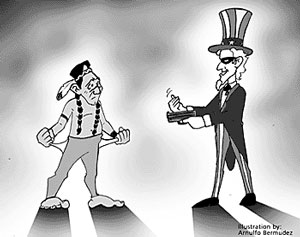In our
debate over
Drew Barrymore's headdress, my opponent made the predictable claim that Barrymore's actions were ignorant, not malicious. My basic attitude was: "So what?"
On Facebook, I posted some thoughts on the question of ignorance vs. malice. This led to the following discussions with Facebook friends.
Posting #1Unlike sticks and stones, racism doesn't hurt anybody? But protesting racism hurts the racists' feelings and thus "stirs hatred" between people? Discuss.
Racist behavior is very harmful. Racist language encourages racist behavior. However, sometimes what appears racist is the result of ignorance or carelessness, not malice. It can still contribute to racist behavior, but that may not be the intent.Yes. Except I don't believe racism requires intent. If you're a racist because of ignorance rather than malice, you're still a racist.
What matters is how your actions affect others. Whatever motivates you in your little mind is a decidedly secondary issue.
We can try educating the ignorant gently rather than harshly. But not educating them because it might hurt their feelings isn't an option.
I agree with your last comment, but would argue intent matters. Many ignorant people can become crusaders against racism (or any -ism) if educated in a supportive manner. That can also occasionally happen with actual racists, but it is much rarer and often requires that they suffer some sort of discrimination or repercussions themselves, first.I'm not sure it matters when they're acting on their racist beliefs. It may matter when we try to educate them. I.e., it may not matter right away, but it matters eventually.
Posting #2A couple of centuries ago, a white man could "legitimately" argue that shooting an Indian or a Negro was like shooting a wild animal. Was that ignorant or malicious racism, and did it matter to the person shot?
Racism is always malicious, even when cloaked in ignorance. I can imagine the shooter saying he had no more feeling for the dead person than a dead bird or rabbit. If you believed he was sincere, you'd have to say he was ignorant rather than malicious.
The point is that what's in his mind doesn't excuse what he did. Whether he shot someone because of ignorance or malice, the victim was dead and he was a racist.
As they say, ignorance (of the law) is no excuse. If you didn't think cheating on your taxes or hitting your spouse was a crime, you're still guilty of it.
If you live in a society with other people, it's at least half your responsibility to learn the rules. You don't go around spitting on people, calling them the n-word, or wearing their headdresses.
Don't start crying about your ignorance when people point out your mistakes. Educate yourself or we'll do it for you.
In my opinion, racism, bigotry, and general intolerance is the result of a person thinking, "You and I are different...but I am superior." Yes, we can argue that this is the result of ignorance rather than malice, but it's a very thin and fuzzy line between the two, and I don't see the point in sniggling about it.As you know, people often offer the
"intent" rationalization for their bad behavior. They didn't mean to offend anyone. As if the offended parties should care why someone offended them. I'm agreeing that that excuse doesn't carry much if any weight.
I know we're on the same page...I'm just feeling cranky about so many people arguing the point. ;)
I vote for "ignorantly malicious racism." Or maybe "maliciously ignorant." You get my point.
Ask Ian Birk.Yes, the officer who shot John T. Williams, the Native woodcarver. The right response would've been to tackle Birk before he shot anyone. And not to worry about his thought processes. Someone could address his "intent" later, after he was off the force and getting the psychological help he needed.
Posting #3Victim to oppressor: "So you don't hate me? You're just profoundly indifferent to whether I exist or not? Gee, thanks for clearing that up. I'm so glad to hear there's no malice in your heart."
For more on the subject, see
Hipster Racism.



No comments:
Post a Comment